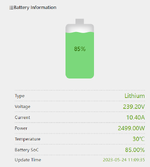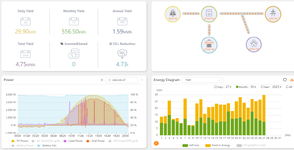Mine are in the garage loft, gets a little warm in summer but not crazy temps and gets coldish in winter but not crazy cold, all well within the spec of the batteries so hopefully all ok. Garage below has a smoke alarm but guess putting one up with the inverter / batteries is not a bad shout.
Pinball info
You are using an out of date browser. It may not display this or other websites correctly.
You should upgrade or use an alternative browser.
You should upgrade or use an alternative browser.
mine are in the garage, unheated but insulated - never gets hot but can get around 5 degrees, so i may have to consider some form of insulation around the batteries - just a bit concerned that they then do not overheat...Mine are in the garage loft, gets a little warm in summer but not crazy temps and gets coldish in winter but not crazy cold, all well within the spec of the batteries so hopefully all ok. Garage below has a smoke alarm but guess putting one up with the inverter / batteries is not a bad shout.
Just pop some of your Chilli con Carne next to themmine are in the garage, unheated but insulated - never gets hot but can get around 5 degrees, so i may have to consider some form of insulation around the batteries - just a bit concerned that they then do not overheat...
you're not going to let that lie are you...Just pop some of your Chilli con Carne next to them
Cut down as I can't answer all of it.
- There are crooks, scammers and people who jump on the bandwagon with no passion.
- But I believe there are good folks out there too, who are vested in the technology
- Not all systems and installs are the same, I paid for more features that I thought were important to me:
- The Tesla Battery has a climate management system so it can live outside and have relatively small impact to storage
- We had a site survey and identified the best location. Outside on a north facing wall, in a shaded corner
- Important to me as I didn't have an obvious internal place to put it that wasn't due for renovation
- I didn't want a battery that suffered charging issues or reduced capacity issues in winter or again in the summer
- We had a site survey and identified the best location. Outside on a north facing wall, in a shaded corner
- The Tesla Gateway handles the island mode and is certified to do this by the grid
- It monitors the energy stored in the battery and how much AC it can give to the house when the grid is down.
- It will then shutdown the battery inverter and the whole house when it can't maintain the power.
- It has a completely new and separate earth rod.
- It monitors the energy stored in the battery and how much AC it can give to the house when the grid is down.
- I don't have an Island Mode socket as my whole house becomes Island Mode but the Gateway can be setup as a distribution board to feed priority only when on reserve
- AC RCD's all function as normal, we did a test during the commissioning stage
- The Tesla Battery has a climate management system so it can live outside and have relatively small impact to storage
- I have a massive dislike for teachers of a topic who don't trust the very subject they are enabling others to do
- If he knows what can make it unsafe, he could ensure he had implemented his own safe system
- And then teach this as observations from experience
- If it can't be made safe, he shouldn't be teaching others to install it
- At worst, he could be encouraging the scammers and and crooks cashing in
- If he knows what can make it unsafe, he could ensure he had implemented his own safe system
- Solar and inverters are not new technology. Batteries are evolving and their uses changing but even lithium batteries are commercially 30 years in the making
- We do know the risks from badly made batteries and ones not looked after
- I would expect the first signs of a significant issue to be with the insurance industry when they were dealing with numerous fire claims
- There is no signs of this when I checked.
- @ianw should we be worried?
That is an interesting point actually, Should house insurance be notified of solar panels / batteries? do they see them as a risk? Maybe another reason for them to bump premiumsCut down as I can't answer all of it.
- There are crooks, scammers and people who jump on the bandwagon with no passion.
- But I believe there are good folks out there too, who are vested in the technology
- Not all systems and installs are the same, I paid for more features that I thought were important to me:
- The Tesla Battery has a climate management system so it can live outside and have relatively small impact to storage
- We had a site survey and identified the best location. Outside on a north facing wall, in a shaded corner
- Important to me as I didn't have an obvious internal place to put it that wasn't due for renovation
- I didn't want a battery that suffered charging issues or reduced capacity issues in winter or again in the summer
- The Tesla Gateway handles the island mode and is certified to do this by the grid
- It monitors the energy stored in the battery and how much AC it can give to the house when the grid is down.
- It will then shutdown the battery inverter and the whole house when it can't maintain the power.
- It has a completely new and separate earth rod.
- I don't have an Island Mode socket as my whole house becomes Island Mode but the Gateway can be setup as a distribution board to feed priority only when on reserve
- AC RCD's all function as normal, we did a test during the commissioning stage
- I have a massive dislike for teachers of a topic who don't trust the very subject they are enabling others to do
- If he knows what can make it unsafe, he could ensure he had implemented his own safe system
- And then teach this as observations from experience
- If it can't be made safe, he shouldn't be teaching others to install it
- At worst, he could be encouraging the scammers and and crooks cashing in
I notified, just had to renew. They specifically cover PV and batteries as part of buildings. Do check though.That is an interesting point actually, Should house insurance be notified of solar panels / batteries? do they see them as a risk? Maybe another reason for them to bump premiums
IndeedI notified, just had to renew. They specifically cover PV and batteries as part of buildings. Do check though.
funny thing is all these cheap china mobile chargers / electric heaters are the worst offenders for house fires by far! But insurance never ask if you purchased those.
None of the guys on the course were scammers… They were genuinly concerned for errors that the course suggested they were making. the domestic solar industry is still relatively new for the UK. So ate the related CoP / Regs etc. Point he was making is we are buying high energy items that are constantly beeing changed by manufacturers who are not being held to account by test authorities enough, it is also not policed enough. He is on various comities to initiate change in the heart of the IET. I have no doubt about his intentions. I will not name him, but for me to respect someone that much only having known him for two days takes a lot!Cut down as I can't answer all of it.
- There are crooks, scammers and people who jump on the bandwagon with no passion.
- But I believe there are good folks out there too, who are vested in the technology
- Not all systems and installs are the same, I paid for more features that I thought were important to me:
- The Tesla Battery has a climate management system so it can live outside and have relatively small impact to storage
- We had a site survey and identified the best location. Outside on a north facing wall, in a shaded corner
- Important to me as I didn't have an obvious internal place to put it that wasn't due for renovation
- I didn't want a battery that suffered charging issues or reduced capacity issues in winter or again in the summer
- The Tesla Gateway handles the island mode and is certified to do this by the grid
- It monitors the energy stored in the battery and how much AC it can give to the house when the grid is down.
- It will then shutdown the battery inverter and the whole house when it can't maintain the power.
- It has a completely new and separate earth rod.
- I don't have an Island Mode socket as my whole house becomes Island Mode but the Gateway can be setup as a distribution board to feed priority only when on reserve
- AC RCD's all function as normal, we did a test during the commissioning stage
- I have a massive dislike for teachers of a topic who don't trust the very subject they are enabling others to do
- If he knows what can make it unsafe, he could ensure he had implemented his own safe system
- And then teach this as observations from experience
- If it can't be made safe, he shouldn't be teaching others to install it
- At worst, he could be encouraging the scammers and and crooks cashing in
Re your AC relays. They will work fine while there are no DC faults on the system. Saturstion of the detection circuit. It happens with modern LED lighting, Induction hobs and PV. It is not a new thing - Google it. I will be replacing mine soon. The more DC stuff you have, the greater chance of DC leakage.
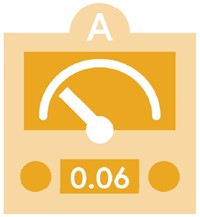
Changes to RCD testing in BS 7671:2018+A2:2022
This article focuses on the changes introduced in Amendment 2 to BS 7671:2018 in respect to testing of RCDs (RCCBs & RCBOs as they are more commonly known), it also addresses a number of common questions relating to RCD technology
Yeaaaa about that… 0-50deg. This is the point. manufacturers are not giving accurate portrayal here. In that range will be optimum and a very fine band above and below without impacting life/performance. How well would you work at 1 degree and 49degree.I did check my bat ratings and they are 0 - 55 and my garage loft does not go close to those temps so hopefully bat life will be ok
I do pretty well at 0 with a coatYeaaaa about that… 0-50deg. This is the point. manufacturers are not giving accurate portrayal here. In that range will be optimum and a very fine band above and below without impacting life/performance. How well would you work at 1 degree and 49degree.
That's there ratings if the battery can't take it they can replace it!
I can’t speak for the batteries (mine are scheduled to be fitted next month, 5 x 5.1Kw INSIDE my external garage, never gets cold/hot in there)
However the inverters have capacitors, they don’t like getting too hot, in my previous job I was involved in the design and manufacture of machinery, they had inverters in them, never had a problem in ‘normal’ ambient temperatures, however every machine that was in some of the hotter country factories (45+ degrees) on the factory floor, hotter in the electrical panels, the inverters failed on a very regular basis, had to retrofit AC systems to maintain a nice 25 degrees, never had an inverter fail thereafter.
My inverters will also being fitted in my garage, the thought of fitting them in a loft space in my mind is madness, PITA to work on and they will see the extreme of temperatures, my loft is unbearable in the summer months.
Chris.
However the inverters have capacitors, they don’t like getting too hot, in my previous job I was involved in the design and manufacture of machinery, they had inverters in them, never had a problem in ‘normal’ ambient temperatures, however every machine that was in some of the hotter country factories (45+ degrees) on the factory floor, hotter in the electrical panels, the inverters failed on a very regular basis, had to retrofit AC systems to maintain a nice 25 degrees, never had an inverter fail thereafter.
My inverters will also being fitted in my garage, the thought of fitting them in a loft space in my mind is madness, PITA to work on and they will see the extreme of temperatures, my loft is unbearable in the summer months.
Chris.
I will read up on ground faults in PV systems.
Good to hear they do care. As consumers, we also have to accept these products have a risk and buy with knowledge, so it is worth sharing these concerns.
We have had 44 micro power cuts today over a 2 hour period.
Each time the powerwall took over fine, it interrupted the solar as the battery was near 100%, once the battery and house load were clear the inverter appeared to be turned on and off as required.
What did become clear is the hand back to an unstable grid was imperfect as the grid would appear up, then go down and the powerwall needed to regain supply.
Twice the broadband rebooted, my fault as the BT router isn't on the UPS. I will fix this as otherwise I think the impact would have been minor.
Next time, I will try to force it to stay offgrid for a longer period and let things settle.
Good to hear they do care. As consumers, we also have to accept these products have a risk and buy with knowledge, so it is worth sharing these concerns.
We have had 44 micro power cuts today over a 2 hour period.
Each time the powerwall took over fine, it interrupted the solar as the battery was near 100%, once the battery and house load were clear the inverter appeared to be turned on and off as required.
What did become clear is the hand back to an unstable grid was imperfect as the grid would appear up, then go down and the powerwall needed to regain supply.
Twice the broadband rebooted, my fault as the BT router isn't on the UPS. I will fix this as otherwise I think the impact would have been minor.
Next time, I will try to force it to stay offgrid for a longer period and let things settle.
For me the garage loft is the perfect location. Out the way and not using up space in the garage. Once fitted we have not had to access or play with them at all. Temps all are well within manufacturer specs.I can’t speak for the batteries (mine are scheduled to be fitted next month, 5 x 5.1Kw INSIDE my external garage, never gets cold/hot in there)
However the inverters have capacitors, they don’t like getting too hot, in my previous job I was involved in the design and manufacture of machinery, they had inverters in them, never had a problem in ‘normal’ ambient temperatures, however every machine that was in some of the hotter country factories (45+ degrees) on the factory floor, hotter in the electrical panels, the inverters failed on a very regular basis, had to retrofit AC systems to maintain a nice 25 degrees, never had an inverter fail thereafter.
My inverters will also being fitted in my garage, the thought of fitting them in a loft space in my mind is madness, PITA to work on and they will see the extreme of temperatures, my loft is unbearable in the summer months.
Chris.
Just noticed the battery temp is graphed as well so been taking a look over the past year at the data and it appears to not drop below 15 in winter and go above 35 in summer, the max ratings on the data sheet are 0 to 50 so well within those and then it says best performance is between 15 and 30 and it’s within that 95% of the time so I’m pretty happy with those results.
I managed 33.6.sooooo close to first 30kw day!
View attachment 220902
Though I was out all day so it just went to the grid
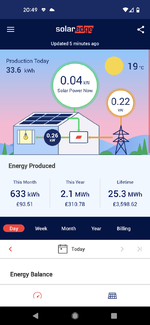
Nice, tiny bit of mine went to charge the battery which was basically full as it never cut in properly the night before (bug with my inverter the battery can take hours to cut in sometimes if there is little load, a big load will force it to cut in very quickly) Then it heated my hot water then rest went to grid as we was out most of the day as well.
I got mine up to 1.21 GW and it just disappeared! 
Larger than 4Kw system?
I got mine up to 1.21 GW and it just disappeared!
| Gigawatt (GW) | 1,000,000,000 (One Billion) Watts |
No wonder it disappeared, you were probably melting the local grid.
Gigawatt (GW) 1,000,000,000 (One Billion) Watts
Hopefully he can travel back in time and correct his mistake.
Got good news from Octopus today, with an average 17% price drop July 1st and another 7% drop tentatively predicted for October:
"From July 1, your energy prices will reduce around 17% on average, because wholesale costs between February and May dropped from their winter peak. A personalised breakdown of your new prices is included with this letter. This price drop (and future price forecasts) is already factored into our regular payment checks, so it has been reducing your monthly payments for a while now. We won’t adjust your payments right now, but we’ll continue to run our checks – if it looks like you could do with an adjustment, we’ll send you a recommendation. While the energy crisis has meant there hasn’t been much in the way of cheaper offers, it’s always worth considering switching tariff or supplier. Energy analysts Cornwall insights expect energy prices to fall slightly (around 7%) in October. But of course that’s not a certainty, and prices could go the other way."
I guess not much solace for those with mortgages with the 0.5% interest rate hike earlier on, but also better than a kick in the nuts.
"From July 1, your energy prices will reduce around 17% on average, because wholesale costs between February and May dropped from their winter peak. A personalised breakdown of your new prices is included with this letter. This price drop (and future price forecasts) is already factored into our regular payment checks, so it has been reducing your monthly payments for a while now. We won’t adjust your payments right now, but we’ll continue to run our checks – if it looks like you could do with an adjustment, we’ll send you a recommendation. While the energy crisis has meant there hasn’t been much in the way of cheaper offers, it’s always worth considering switching tariff or supplier. Energy analysts Cornwall insights expect energy prices to fall slightly (around 7%) in October. But of course that’s not a certainty, and prices could go the other way."
I guess not much solace for those with mortgages with the 0.5% interest rate hike earlier on, but also better than a kick in the nuts.
Not looking forward to my mortgage renewal as currently on 1% Lolol.Got good news from Octopus today, with an average 17% price drop July 1st and another 7% drop tentatively predicted for October:
"From July 1, your energy prices will reduce around 17% on average, because wholesale costs between February and May dropped from their winter peak. A personalised breakdown of your new prices is included with this letter. This price drop (and future price forecasts) is already factored into our regular payment checks, so it has been reducing your monthly payments for a while now. We won’t adjust your payments right now, but we’ll continue to run our checks – if it looks like you could do with an adjustment, we’ll send you a recommendation. While the energy crisis has meant there hasn’t been much in the way of cheaper offers, it’s always worth considering switching tariff or supplier. Energy analysts Cornwall insights expect energy prices to fall slightly (around 7%) in October. But of course that’s not a certainty, and prices could go the other way."
I guess not much solace for those with mortgages with the 0.5% interest rate hike earlier on, but also better than a kick in the nuts.
My solar/battery install was completed yesterday, so today being the first day to see any meaningful results, I have to say I’m somewhat overwhelmed by it, the weather here started of as extremely overcast, not a bit of blue in the sky or anything near! Come lunch time things improved some blue sky and sun, improving during the day until reverting back to being somewhat overcast in the late afternoon, but the results as said staggered me….
Started the day with the batteries at 20%, they started charging very nicely, I have appx 12Kw of panels total, what I still don’t understand is the inverters are a total of 10Kw?? So peak hit just over 10.5Kw, the batteries charged to 99%, at that point I plugged in the EV as I’m not yet being paid to feed in , charged the car up from 70 to 85% of its 100Kw battery, by the time evening hit the solar batteries were back up to 95%.
, charged the car up from 70 to 85% of its 100Kw battery, by the time evening hit the solar batteries were back up to 95%.
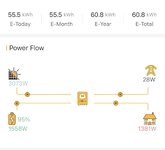
Time to turn on the pins, they seem to use around 2.5-3.0Kw (13 machines) played for about 1 3/4 hours and the batteries were down to 80%
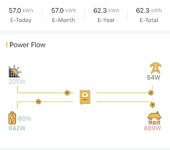
Seems I’ve turned into a solar anorak!
57Kw of generation, seems to charge the batteries like filling a bucket from a tap, perhaps more batteries required as I drive quite a lot of miles during the daytime.
Learning curve seems steep!
Chris.
Started the day with the batteries at 20%, they started charging very nicely, I have appx 12Kw of panels total, what I still don’t understand is the inverters are a total of 10Kw?? So peak hit just over 10.5Kw, the batteries charged to 99%, at that point I plugged in the EV as I’m not yet being paid to feed in

Time to turn on the pins, they seem to use around 2.5-3.0Kw (13 machines) played for about 1 3/4 hours and the batteries were down to 80%

Seems I’ve turned into a solar anorak!
57Kw of generation, seems to charge the batteries like filling a bucket from a tap, perhaps more batteries required as I drive quite a lot of miles during the daytime.
Learning curve seems steep!
Chris.
Your peak might be 12kW but most of the time, you will get lower than that, and a smaller inverter is cheaper. Plus, I have read, inverters are most efficient close to their operational peak, so getting a larger one, that you will rarely hit the peak of, will not be as efficient. You will overal, generate more with one that is occasionally capped.

